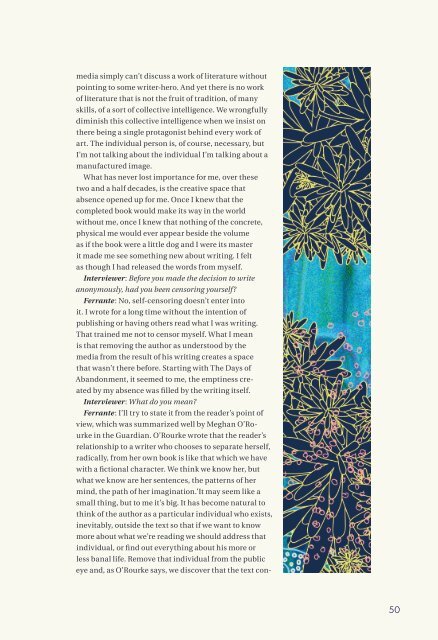magazine_final_online
You also want an ePaper? Increase the reach of your titles
YUMPU automatically turns print PDFs into web optimized ePapers that Google loves.
media simply can’t discuss a work of literature without<br />
pointing to some writer-hero. And yet there is no work<br />
of literature that is not the fruit of tradition, of many<br />
skills, of a sort of collective intelligence. We wrongfully<br />
diminish this collective intelligence when we insist on<br />
there being a single protagonist behind every work of<br />
art. The individual person is, of course, necessary, but<br />
I’m not talking about the individual I’m talking about a<br />
manufactured image.<br />
What has never lost importance for me, over these<br />
two and a half decades, is the creative space that<br />
absence opened up for me. Once I knew that the<br />
completed book would make its way in the world<br />
without me, once I knew that nothing of the concrete,<br />
physical me would ever appear beside the volume<br />
as if the book were a little dog and I were its master<br />
it made me see something new about writing. I felt<br />
as though I had released the words from myself.<br />
Interviewer: Before you made the decision to write<br />
anonymously, had you been censoring yourself?<br />
Ferrante: No, self-censoring doesn’t enter into<br />
it. I wrote for a long time without the intention of<br />
publishing or having others read what I was writing.<br />
That trained me not to censor myself. What I mean<br />
is that removing the author as understood by the<br />
media from the result of his writing creates a space<br />
that wasn’t there before. Starting with The Days of<br />
Abandonment, it seemed to me, the emptiness created<br />
by my absence was filled by the writing itself.<br />
Interviewer: What do you mean?<br />
Ferrante: I’ll try to state it from the reader’s point of<br />
view, which was summarized well by Meghan O’Rourke<br />
in the Guardian. O’Rourke wrote that the reader’s<br />
relationship to a writer who chooses to separate herself,<br />
radically, from her own book is like that which we have<br />
with a fictional character. We think we know her, but<br />
what we know are her sentences, the patterns of her<br />
mind, the path of her imagination.’It may seem like a<br />
small thing, but to me it’s big. It has become natural to<br />
think of the author as a particular individual who exists,<br />
inevitably, outside the text so that if we want to know<br />
more about what we’re reading we should address that<br />
individual, or find out everything about his more or<br />
less banal life. Remove that individual from the public<br />
eye and, as O’Rourke says, we discover that the text con-<br />
50


